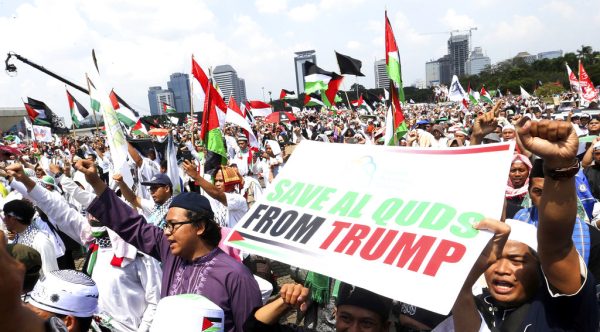
The protests against the museum in Sulawesi are a sign of the disturbing persistence of anti-Semitism in the world’s largest Muslim-majority nation.
Protesters shout slogans “God is Great” during a rally against the U.S. plan to move its embassy in Israel from Tel Aviv to Jerusalem, at Monas, the national monument, in Jakarta, Indonesia, May 11, 2018.
Last week saw the opening of Indonesia’s – and Southeast Asia’s – first museum dedicated to the victims of the Holocaust. The Shaar Hashamayim Holocaust Museum was built by the local Jewish community in Tondano City, Sulawesi, and was inaugurated by the German Ambassador to Indonesia Ina Lepel on January 27.
After attending the opening, Lepel posted a video to Twitter in which she hailed the museum as a crucial landmark of remembrance. “Germany will always support remembrance towards this ‘universal lesson’ and stand up against racism, anti-Semitism, and any form of intolerance,” Lepel said in her video. “We keep remembering the extraordinary crimes that occurred in the Holocaust. Otherwise, we risk repeating them again.”
But in the days after its opening, a number of Indonesian Muslim leaders, including several senior members of the influential Indonesian Council of Ulama (Majelis Ulama Indonesia, MUI) declared that the museum should be shut down, on the grounds that it could cause “communal tensions.” MUI Vice President Muhyidin Junaidi opined that “the presence of the museum is politically tendentious and a provocation to cause uproar among the people.”
“Instead of a museum about the Holocaust, the government should open a museum depicting Dutch colonial rule in Indonesia,” he added. “Or it would make more sense to show the Zionist violence against the Palestinians; this would be a way to support their right to self-determination.”
Diplomat Brief Weekly Newsletter N Get briefed on the story of the week, and developing stories to watch across the Asia-Pacific. Get the Newsletter
Meanwhile, a senior official from the Prosperous Justice Party (PKS), one of Indonesia’s leading Islamist political parties, said that the museum somehow undermined the Indonesian government’s opposition to Israel’s occupation of Gaza and the West Bank and requested that the Minister of Foreign Affairs summon the German Ambassador to protest against the opening of the museum.
Enjoying this article? Click here to subscribe for full access. Just $5 a month.
According to the United Indonesian Jewish Community, there are just 200 practicing Jews in Indonesia today, out of a total population of more than 273 million, most of whom now reside in Sulawesi. Tondano is home to approximately 20 Jews, who built the Shaar Hashamayim synagogue in 2003.
Although the principle of religious tolerance is enshrined in the Indonesian constitution and forms an important part of the national philosophy known as Pancasila, suspicion of Jews is common in Indonesia. In particular, local Jewish communities are viewed as proxies for the state of Israel, which is deeply unpopular in Indonesia due to its treatment of the Palestinian people of Gaza and the West Bank, and with which Indonesia does not have diplomatic relations.
When the U.S. government announced that it was moving its embassy from Tel Aviv to Jerusalem in 2018, protests erupted in the capital Jakarta, organized by MUI and the more radical and since-banned Islamic Defenders Front (Front Pembela Islam). The Abraham Accords, the recent normalization agreements between Israel and the United Arab Emirates and Bahrain, have also been the subject of periodic protests in front of the U.S. Embassy in Jakarta.
But as the opposition to the Holocaust Museum in Sulawesi demonstrates, valid criticisms of Israel’s policy toward the Palestinians frequently slide into open anti-Semitism, especially on the more extreme end of the Islamist political spectrum. Fears of violent attacks prompt many Indonesian Jews to hide their religious identity, and Judaism is not included in the country’s six officially recognized religions. In 2013, a synagogue in Surabaya was demolished, four years after Islamic zealots forced it to close its doors during protests against Operation Cast Lead, an Israeli air offensive on the Gaza Strip.
According to one leading Indonesian rabbi, this anti-Semitism also contains anti-colonial residues. The first Jews arrived in Indonesia in the 17th century, as part of the clerks and traders operating the rapacious Dutch East India Company, and this distant legacy continues to color popular perceptions of the country’s tiny Jewish community. “We are all Dutch descendants,” Rabbi Benjamin Meijer Verbrugge told Israel’s Haaretz newspaper in 2019. “People call us bastards because our grandfathers occupied Indonesia. So we face two kinds of problems: One is our Dutch heritage; the other is the anti-Jewish sentiment.”
As well as demonstrating the continued salience of virulent anti-Semitism on Indonesia’s ultra-religious fringe, the comments that attended the landmark opening of the Shaar Hashamayim Holocaust Museum suggest the extent of the domestic political challenges facing any attempt by Indonesia to normalize its relations with Israel. U.S. Secretary of State Antony Blinken raised the issue of Indonesia joining the Abraham Accords during his visit to Jakarta in December, and some have argued that the prospects for normalization are better than they have been for some time.
But if even the commemoration of the Holocaust in remote Sulawesi excites such reactions, it is hard to imagine any Indonesian government making the leap to normalization. As one analyst noted last year, “the risk of popular outrage and the damage it could do to the government’s legitimacy, credibility, popularity, and power are simply too large for Jakarta to consider joining the Abraham Accords.”







